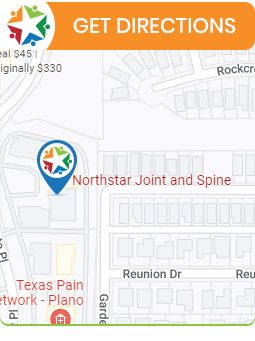Back Pain Doctor in Plano, TX
Back pain is a common issue, often mild but sometimes severe. While regular stretching and exercise are key to maintaining back health, medical conditions can still cause complications. Dr. Robert Nocerini, MD, a board-certified pain management doctor at Northstar Joint and Spine, provides effective treatment for relief. For more information, please contact us today or schedule an appointment online. We are conveniently located at 7704 San Jacinto Pl Suite #200 Plano, TX 75024.
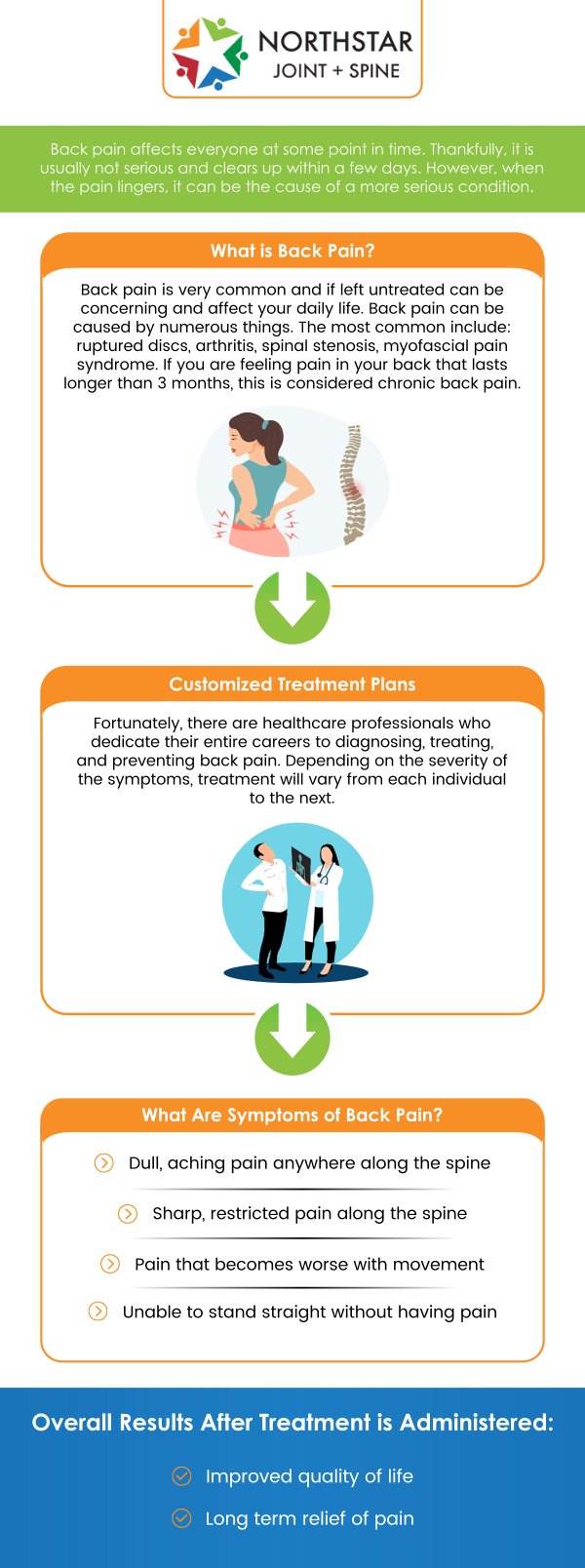
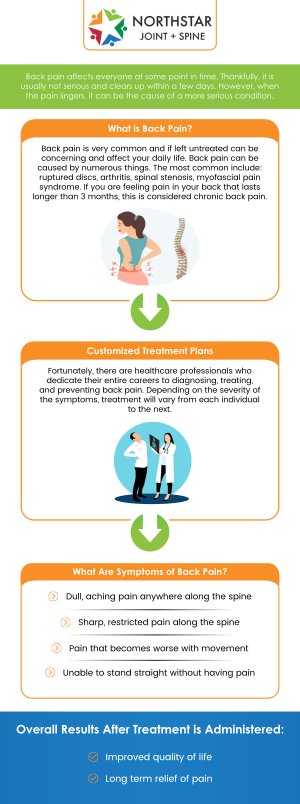
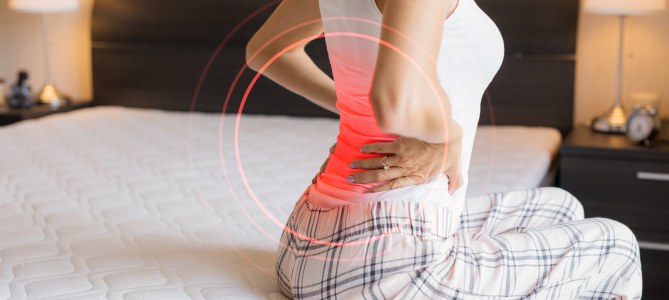
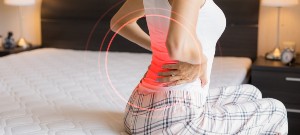
Table of Contents:
How do I know if my back pain is serious?
What causes back pain in females?
What can I do to relieve my back pain at home?
What organs can cause lower back pain?
Can back pain be a sign of a serious condition?
Can back pain affect sleep?
How Dr. Robert Nocerini, MD, Board-Certified Pain Management Specialist, Can Help Alleviate Your Back Pain in Plano, TX
If your back pain is accompanied by any of the following symptoms, seek medical attention right away:
• Fever of 100.4ºF or above
• Unexplained weight loss
• Swelling of the back
• Constant back pain that does not ease after resting or lying down
• Pain down your legs and below the knees
• Loss of bladder control
• Inability to pass urine
• Loss of bowel control
• Numbness (loss of feeling, or a tingling sensation) around the pelvic region
• If you have osteoporosis
• If you had a recent infection
Piriformis Syndrome: Piriformis syndrome is pain originating from spasms in your piriformis muscle, a small muscle located deep in the buttock. Due to hormone and pregnancy-related changes in the pelvis, women are affected more by piriformis syndrome than men are.
Sacroiliac Joint Dysfunction: The sacroiliac (SI) joint connects the bottom of your spine to your pelvis. Pain in the SI joint is called sacroiliac joint dysfunction or sacroiliitis. Compared to men, women typically have a smaller SI joint surface area, resulting in a higher concentration of stresses across the joint. The sacrum in women is also wider, less curved, more uneven, and tilted more backward, which may cause problems in the sacroiliac joint.
Spinal Osteoarthritis: Wear and tear arthritis of the facet joints that connect your vertebrae is common in women. The risk is greater with an increase in weight and with age.
Degenerative Spondylolisthesis: Degenerative spondylolisthesis refers to the slipping of one vertebra over another due to degeneration. Due to lower levels of estrogen, the condition is more common in post-menopausal women. When estrogen levels are low, spinal instability is caused by the degradation of the vertebral discs and the loosening of the ligaments that hold the vertebrae together. Among this age group, there is also a higher chance of associated spinal osteoarthritis, increasing the risk of vertebral slippage.
Endometriosis: A gynecological disorder that exclusively affects women, endometriosis is a condition that causes the tissues of the uterus to grow outside the womb.
Spinal Osteoporosis Fractures: Osteoporosis occurs when the density of your bone decreases, making it fragile and susceptible to fracture. When there is a higher rate of bone loss compared to new bone formation, osteoporosis occurs. In the post-menopausal age, women are four times more likely to develop osteoporosis than men are. This dissimilitude may be due to loss of bone at a younger age, the deficiency of the estrogen hormone, and loss of bone at a more rapid pace.
Unidentified: Women may also experience back pain with no identifiable cause. Typical changes in a woman’s lifecycle can trigger a torrent of events leading to back pain, including hormonal imbalances, pregnancy, childbirth, and weight gain, particularly in the abdomen.
Consult a pain management physician right away if you have back pain that is not relieved by self-care, affects your daily work, or causes neurological symptoms (numbness or weakness). A pain management physician can help diagnose and treat the cause of your back pain and help prevent back pain in the future.
A few things you can practice to relieve back pain are:
• Stretch often
• Maintain good posture
• Maintain a healthy weight
• Quit smoking
• Use ice and heat packs
• Try a medicated cream
Lower back pain can be caused by several organs, including the kidneys (stones or infections), pancreas (pancreatitis), colon (constipation or colitis), uterus (fibroids or endometriosis in women), bladder (infections or retention), appendix (appendicitis), prostate (prostatitis or BPH in men), and the aorta (aneurysm). If pain persists, it’s important to consult a doctor for diagnosis.
Yes, back pain can sometimes be a sign of a serious condition. While most back pain is due to common issues like muscle strain, poor posture, or a herniated disc, in some cases, it can indicate a more serious underlying problem. For example, back pain may be linked to kidney infections, kidney stones, or problems with the pancreas, such as pancreatitis.
In rare cases, back pain can be a symptom of heart-related issues, such as a heart attack, especially if the pain is accompanied by other symptoms like chest pain, shortness of breath, or dizziness. Furthermore, conditions like aortic aneurysms or infections in the spinal discs (discitis) can lead to severe and chronic pain. If back pain is accompanied by symptoms like numbness, weakness, fever, unexplained weight loss, or pain that doesn’t improve with rest or is getting worse, it’s important to seek medical attention promptly. Early diagnosis and treatment are crucial for addressing any serious conditions effectively.
Back pain can significantly affect sleep. Chronic or severe back pain often makes it difficult to find a comfortable position, which can disrupt sleep patterns and lead to restless nights. Pain may cause you to wake up frequently, preventing you from reaching deeper stages of restorative sleep. Over time, poor sleep quality due to back pain can contribute to fatigue, mood swings, and even increased sensitivity to pain.
Certain sleeping positions can exacerbate back pain, especially if the spine is not properly aligned during sleep. For example, sleeping on your stomach can put extra pressure on the lower back, while sleeping on your side without proper support can strain the hips and spine. On the other hand, sleeping with proper support using pillows to align the spine or opting for a firmer mattress may help reduce pain and improve sleep quality.
If back pain is causing significant sleep disturbances, it’s important to consult a healthcare provider for treatment options. Proper pain management, physical therapy, and lifestyle changes may help relieve pain and improve sleep.
Dr. Robert Nocerini, MD, a board-certified pain management specialist at Northstar Joint and Spine in Plano, TX, offers expert care for individuals suffering from back pain. With over 26 years of experience, Dr. Nocerini specializes in treating conditions such as chronic lower back pain, sciatica, herniated discs, and arthritis. His comprehensive approach focuses on diagnosing the root cause of your pain and creating personalized, non-surgical treatment plans to help you achieve long-term relief and improved mobility.
At Northstar Joint and Spine, Dr. Nocerini utilizes advanced treatments like epidural steroid injections, facet joint injections, nerve blocks, and spinal cord stimulation to reduce pain and restore function. His goal is to improve your quality of life without the need for invasive surgery. Whether you’re experiencing acute pain or have been dealing with a chronic condition, Dr. Nocerini’s expertise and patient-centered care can guide you toward a pain-free future.
If you or someone you know is experiencing back pain, come see the specialists at Northstar Joint and Spine today! Our kind and compassionate professionals are experienced in treating back pain and can help relieve your symptoms. For more information on our back pain treatments, contact our office and get in touch with a member of our specialist team. To book an appointment with our back pain specialist, visit our website or speak with us over the phone today. We look forward to serving you! We are conveniently located at 7704 San Jacinto Pl Suite #200 Plano, TX 75024. We serve patients from Plano TX, Willow Bend TX, Frisco TX, Allen TX, Addison TX, North Dallas TX, and surrounding areas.

Check Out Our 5 Star Reviews


Additional Services You May Need
▸ Back Pain
▸ Shoulder Pain
▸ Chronic Pain
▸ Epidural Steroid Injections
▸ Spinal Cord Stimulation
▸ Viscosupplementation
▸ Genicular Nerve Blocks
▸ Facet Injections
▸ Joint Injections
▸ Sacroiliac Joint Injections
▸ Lumbar and Cervical
▸ Facet Medial Branch Blocks
▸ Diagnostic Nerve Blocks
▸ Medication Management
▸ Neck Pain Doctor
▸ Diabetic Peripheral Neuropathy
▸ Headaches
▸ Suboxone
▸ Peripheral Nerve Stimulation
▸ Spine
▸ Joints
▸ Muscles
▸ Bones

Additional Services You May Need
▸ Back Pain
▸ Shoulder Pain
▸ Chronic Pain
▸ Epidural Steroid Injections
▸ Spinal Cord Stimulation
▸ Viscosupplementation
▸ Genicular Nerve Blocks
▸ Facet Injections
▸ Joint Injections
▸ Sacroiliac Joint Injections
▸ Lumbar and Cervical
▸ Facet Medial Branch Blocks
▸ Diagnostic Nerve Blocks
▸ Medication Management
▸ Neck Pain Doctor
▸ Diabetic Peripheral Neuropathy
▸ Headaches
▸ Suboxone
▸ Peripheral Nerve Stimulation
▸ Spine
▸ Joints
▸ Muscles
▸ Bones

